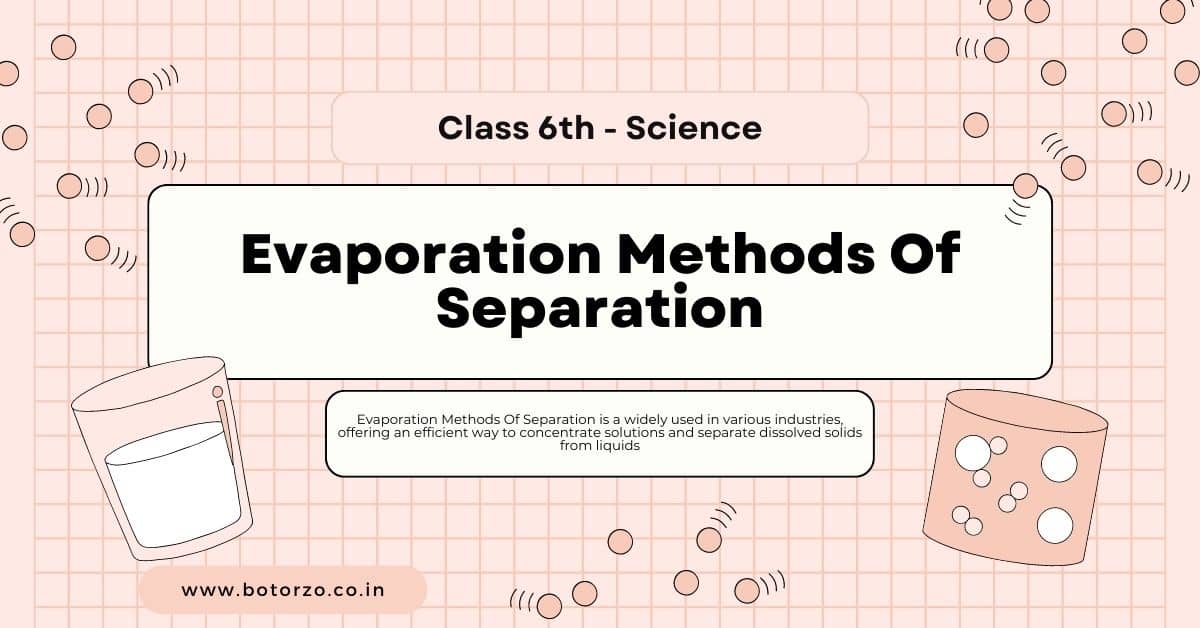Evaporation Methods Of Separation is widely used in various industries, offering an efficient way to concentrate solutions and separate dissolved solids from liquids. In this article, we will explore the different evaporation methods, their applications, advantages, disadvantages, factors affecting efficiency, environmental impact, and innovations in technology.
Introduction
Evaporation is a process that involves the conversion of a liquid into a vapour by supplying heat energy. It is commonly used for concentrating solutions, removing water from liquids, and separating dissolved solids. Evaporation methods find extensive application in industries such as water treatment, food and beverage, pharmaceuticals, and chemicals.
What is Evaporation?
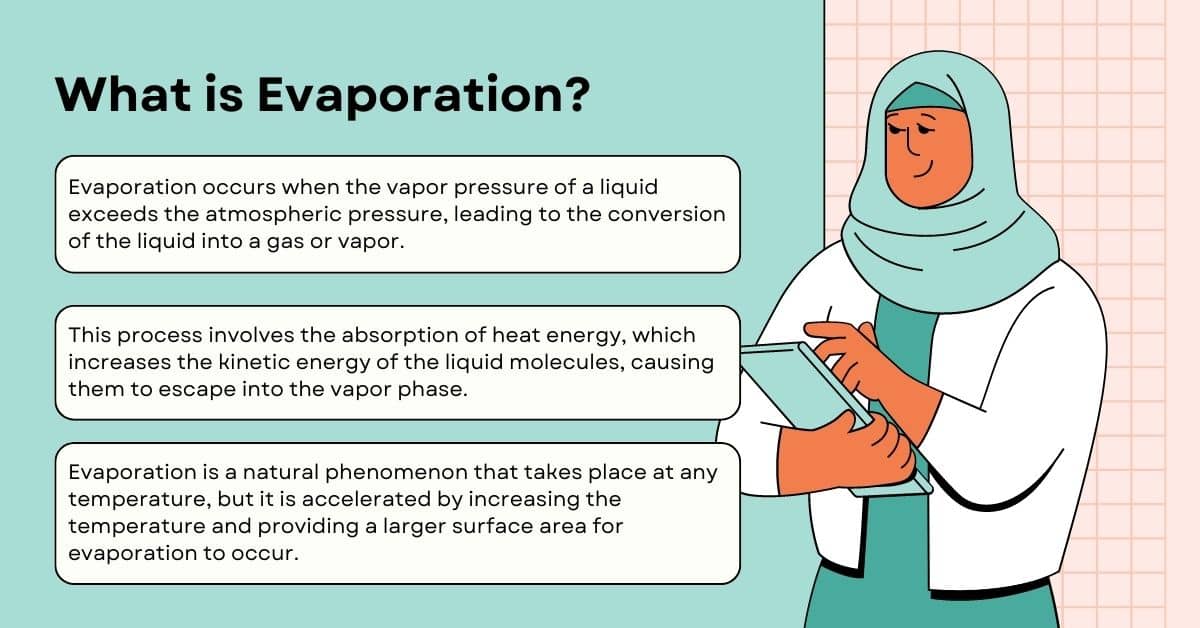
Evaporation occurs when the vapor pressure of a liquid exceeds the atmospheric pressure, leading to the conversion of the liquid into a gas or vapor. This process involves the absorption of heat energy, which increases the kinetic energy of the liquid molecules, causing them to escape into the vapor phase.
Evaporation is a natural phenomenon that takes place at any temperature, but it is accelerated by increasing the temperature and providing a larger surface area for evaporation to occur.
Related Post: Sedimentation, Decantation, and Filtration
Sieving Method of Separation, Advantages and Disadvantages
Winnowing Method Of Separation
Threshing Method Of Separation
Handpicking – Methods Of Separation
Principles of Evaporation Methods
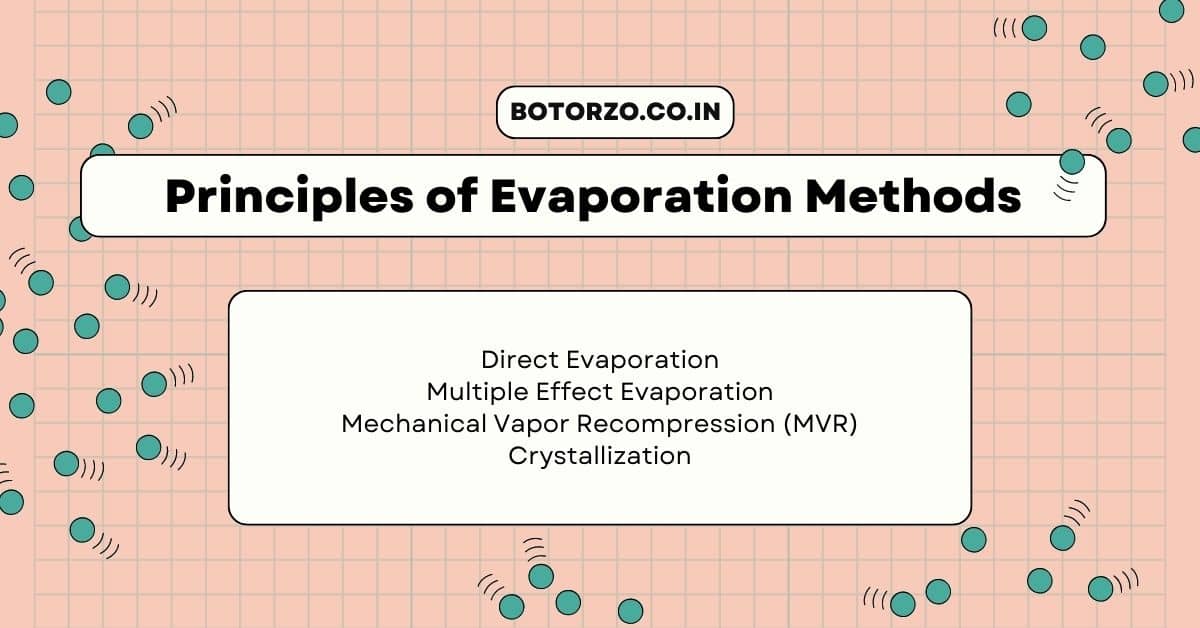
Direct Evaporation
Direct evaporation is a simple evaporation method where the liquid to be concentrated is heated directly in an open vessel. The heat source raises the temperature of the liquid, causing the solvent to evaporate while leaving behind the concentrated solute.
Multiple Effect Evaporation
Multiple-effect evaporation is a more energy-efficient method that utilizes the latent heat of vaporization from one evaporator to heat another. The process involves a series of evaporators operating at different pressures. The vapour generated in one evaporator is used as a heating medium in the next, resulting in the gradual concentration of the liquid.
Mechanical Vapor Recompression (MVR)
Mechanical Vapor Recompression (MVR) is a technique where the vapour generated during evaporation is compressed and reused as a heating source. This method significantly reduces energy consumption by utilizing the latent heat from the compressed vapour.
Crystallization
Crystallization is an evaporation method employed to separate solids from a solution. It involves cooling the concentrated solution, causing the solute to precipitate in the form of crystals. Crystallization is widely used in industries such as pharmaceuticals and chemicals for the production of pure compounds.
Application of Evaporation Methods
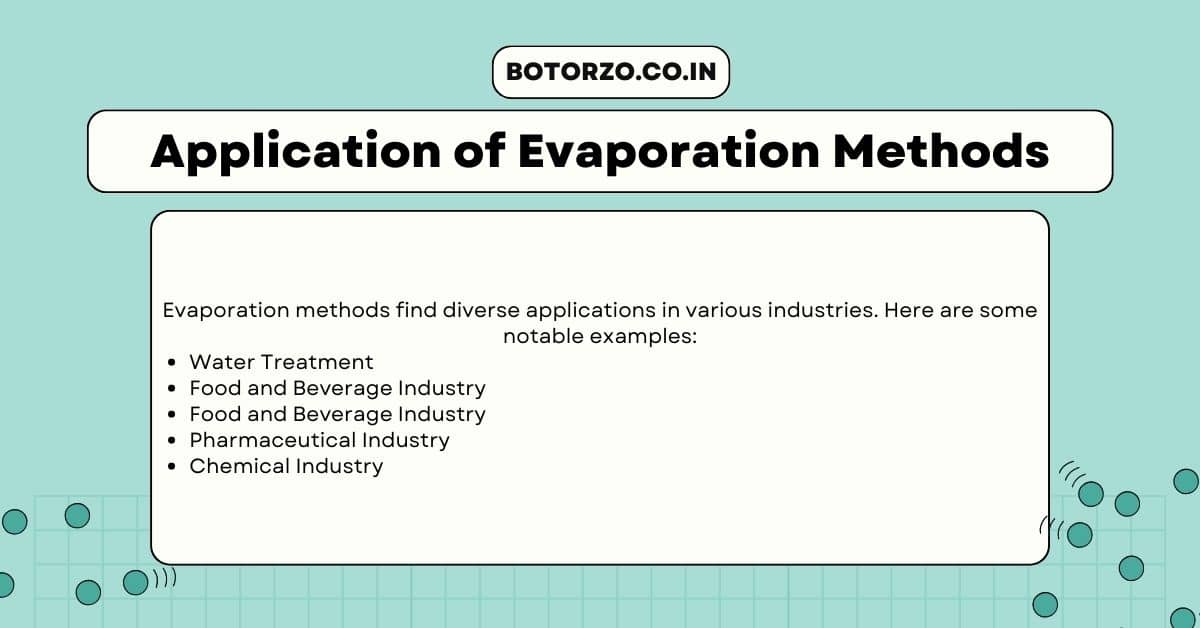
Evaporation methods find diverse applications in various industries. Here are some notable examples:
Water Treatment
Evaporation plays a crucial role in water treatment processes, including desalination, wastewater treatment, and brine concentration. It enables the removal of impurities and the recovery of valuable resources.
Food and Beverage Industry
The food and beverage industry extensively utilizes evaporation methods for concentration, preservation, and separation. It is commonly employed in the production of fruit juices, dairy products, syrups, and extracts.
Pharmaceutical Industry
In the pharmaceutical industry, evaporation is used for solvent recovery, concentration of active pharmaceutical ingredients (APIs), and purification of compounds. It ensures the production of high-quality drugs and reduces waste.
Chemical Industry
Evaporation is widely applied in the chemical industry for concentrating solutions, recovering solvents, and producing crystalline solids. It enables the separation of different components based on their boiling points.
Advantages of Evaporation Methods
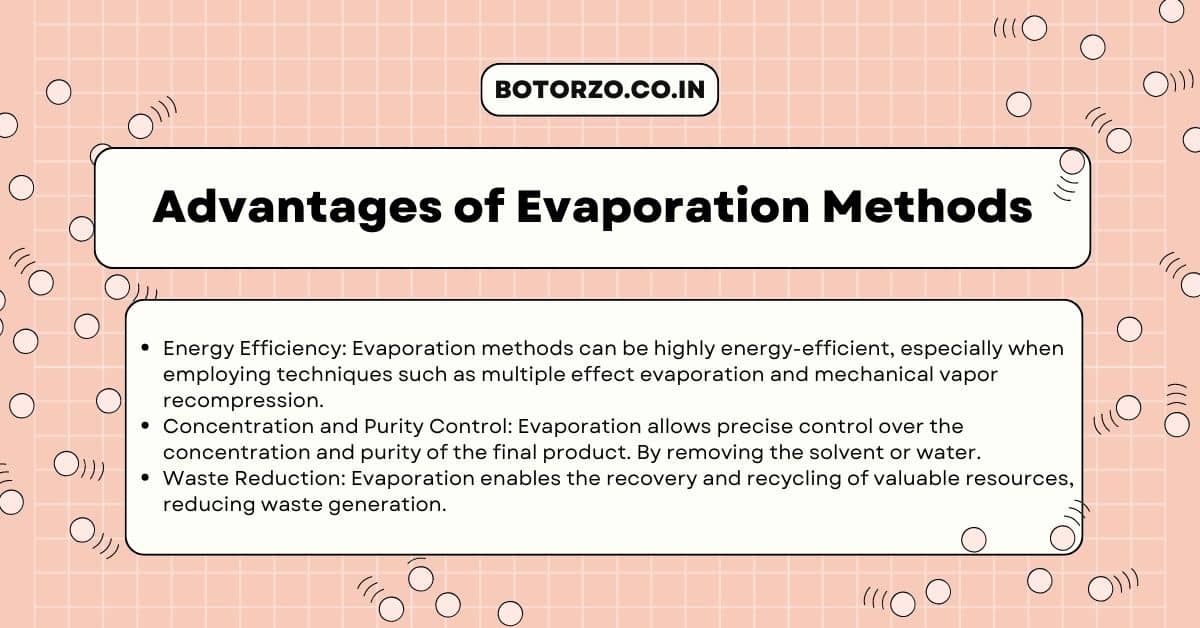
Evaporation methods offer several advantages in various industrial processes. Some notable advantages include:
Energy Efficiency
Evaporation methods can be highly energy-efficient, especially when employing techniques such as multiple effect evaporation and mechanical vapor recompression. These methods utilize the latent heat of vaporization, reducing the overall energy consumption.
Concentration and Purity Control
Evaporation allows precise control over the concentration and purity of the final product. By removing the solvent or water, it helps in achieving the desired concentration levels and eliminating impurities.
Waste Reduction
Evaporation enables the recovery and recycling of valuable resources, reducing waste generation. It can also facilitate the disposal of concentrated effluents by converting them into solid or crystalline form.
Disadvantages of Evaporation Methods
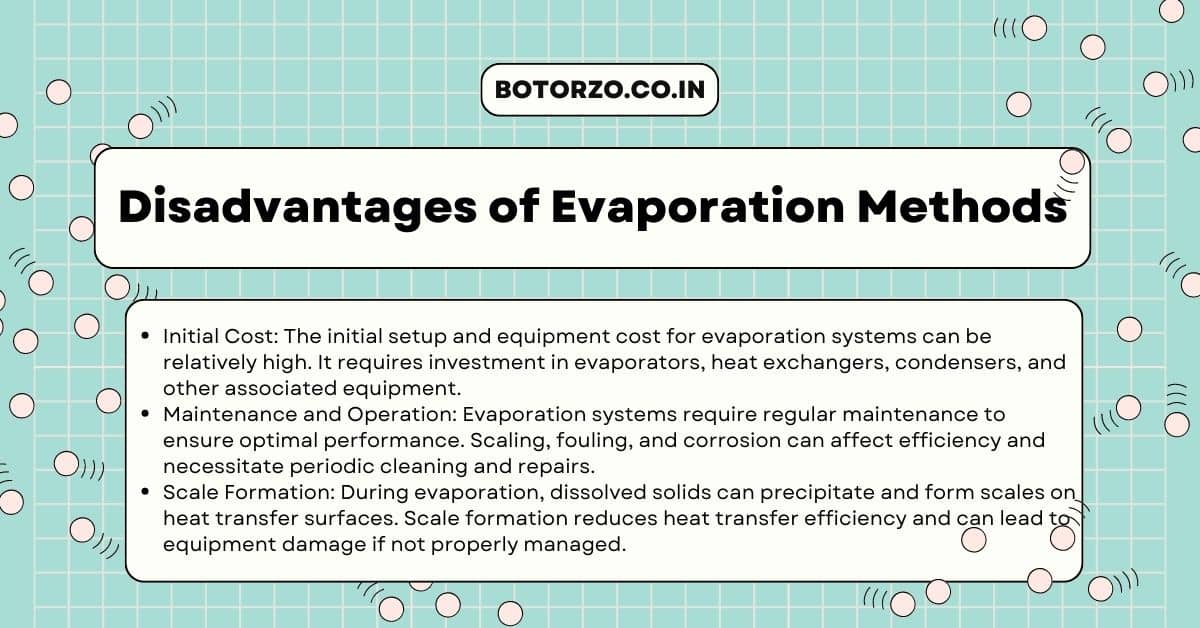
While evaporation methods offer numerous benefits, they also have certain disadvantages that need to be considered. These include:
Initial Cost
The initial setup and equipment cost for evaporation systems can be relatively high. It requires investment in evaporators, heat exchangers, condensers, and other associated equipment.
Maintenance and Operation
Evaporation systems require regular maintenance to ensure optimal performance. Scaling, fouling, and corrosion can affect efficiency and necessitate periodic cleaning and repairs.
Scale Formation
During evaporation, dissolved solids can precipitate and form scales on heat transfer surfaces. Scale formation reduces heat transfer efficiency and can lead to equipment damage if not properly managed.
Factors Affecting Evaporation Efficiency
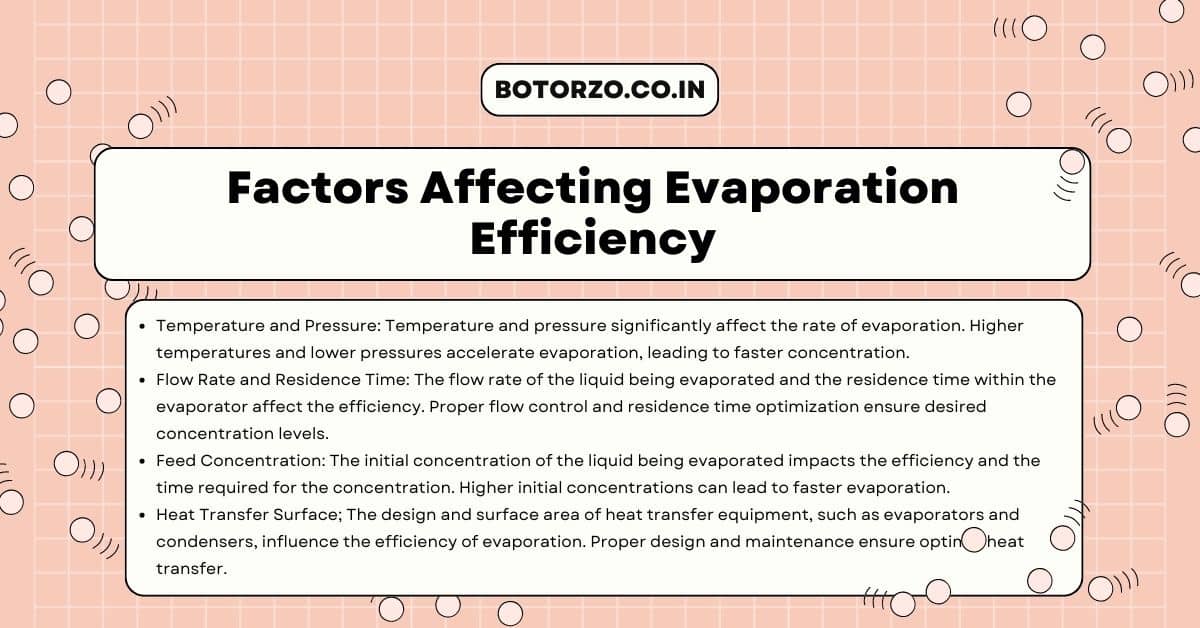
Several factors influence the efficiency of evaporation methods. Understanding and optimizing these factors can enhance overall performance. The key factors include:
Temperature and Pressure
Temperature and pressure significantly affect the rate of evaporation. Higher temperatures and lower pressures accelerate evaporation, leading to faster concentration.
Flow Rate and Residence Time
The flow rate of the liquid being evaporated and the residence time within the evaporator affect the efficiency. Proper flow control and residence time optimization ensure desired concentration levels.
Feed Concentration
The initial concentration of the liquid being evaporated impacts the efficiency and the time required for the concentration. Higher initial concentrations can lead to faster evaporation.
Heat Transfer Surface
The design and surface area of heat transfer equipment, such as evaporators and condensers, influence the efficiency of evaporation. Proper design and maintenance ensure optimal heat transfer.
Environmental Impact of Evaporation Methods
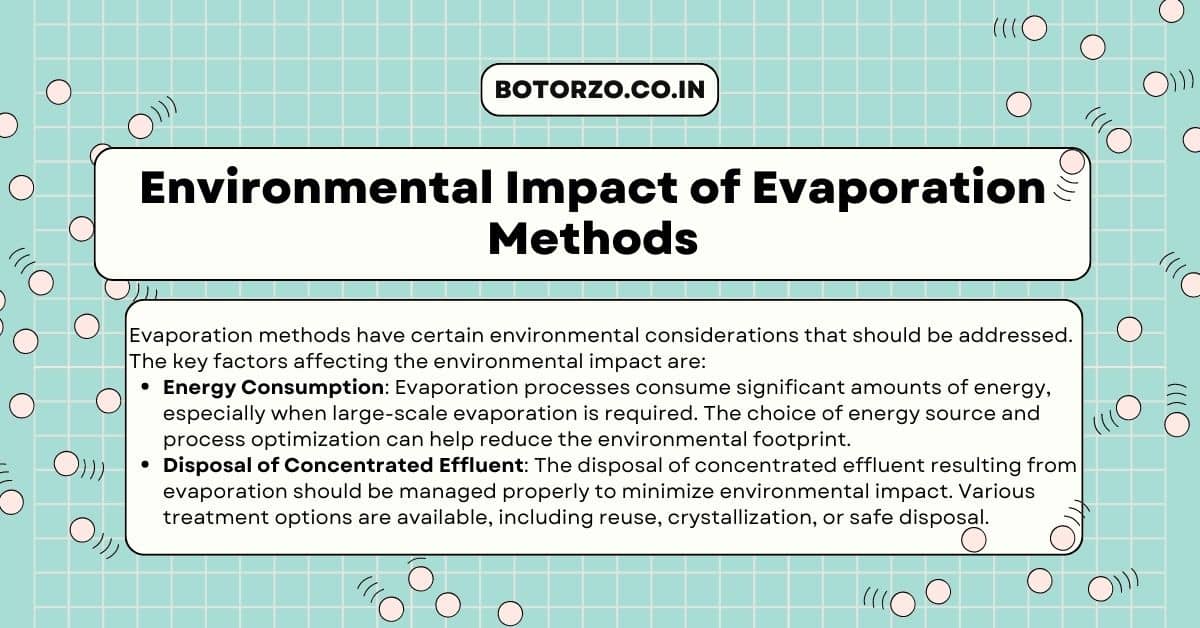
Evaporation methods have certain environmental considerations that should be addressed. The key factors affecting the environmental impact are:
Energy Consumption
Evaporation processes consume significant amounts of energy, especially when large-scale evaporation is required. The choice of energy source and process optimization can help reduce the environmental footprint.
Disposal of Concentrated Effluent
The disposal of concentrated effluent resulting from evaporation should be managed properly to minimize environmental impact. Various treatment options are available, including reuse, crystallization, or safe disposal.
Innovations in Evaporation Technologies
Continuous advancements in evaporation technologies aim to improve efficiency, reduce energy consumption, and enhance process sustainability. Some notable innovations include:
Membrane Evaporation
Membrane evaporation combines traditional evaporation with membrane separation processes. It allows for the selective removal of specific components, resulting in enhanced concentration efficiency.
Hybrid Systems
Hybrid evaporation systems integrate multiple separation techniques, such as evaporation, membrane separation, and crystallization. These systems maximize efficiency and product recovery while minimizing energy consumption.
10. Conclusion
Evaporation methods of separation play a crucial role in various industries, offering efficient ways to concentrate solutions, separate dissolved solids, and recover valuable resources. With advancements in technology and process optimization, evaporation continues to be a reliable and sustainable separation method. Understanding the principles, applications, advantages, and limitations of evaporation methods is essential for industries seeking effective separation solutions.
FAQs
Is evaporation an energy-intensive process?
Evaporation processes can consume significant amounts of energy, especially in large-scale operations. However, advancements in technology, such as mechanical vapour recompression, have significantly reduced energy consumption.
Where can I learn more about evaporation technologies and their applications?
To gain more in-depth knowledge about evaporation technologies and their applications, it is recommended to refer to specialized industry publications, attend conferences, or consult with experts in the field
Can evaporation be used for water treatment?
Yes, evaporation is widely used in water treatment processes, including desalination, wastewater treatment, and brine concentration. It helps in removing impurities and recovering valuable resources.
What are the disadvantages of evaporation methods?
Some disadvantages of evaporation methods include the initial cost of equipment, the need for regular maintenance and cleaning, and the potential for scale formation on heat transfer surfaces.
Are there any environmentally friendly alternatives to evaporation methods?
While evaporation methods have certain environmental impacts, continuous advancements have led to the development of hybrid systems and membrane evaporation techniques that improve efficiency and reduce energy consumption.
EngineeringAdda.in is a great website for new and fresh content.

